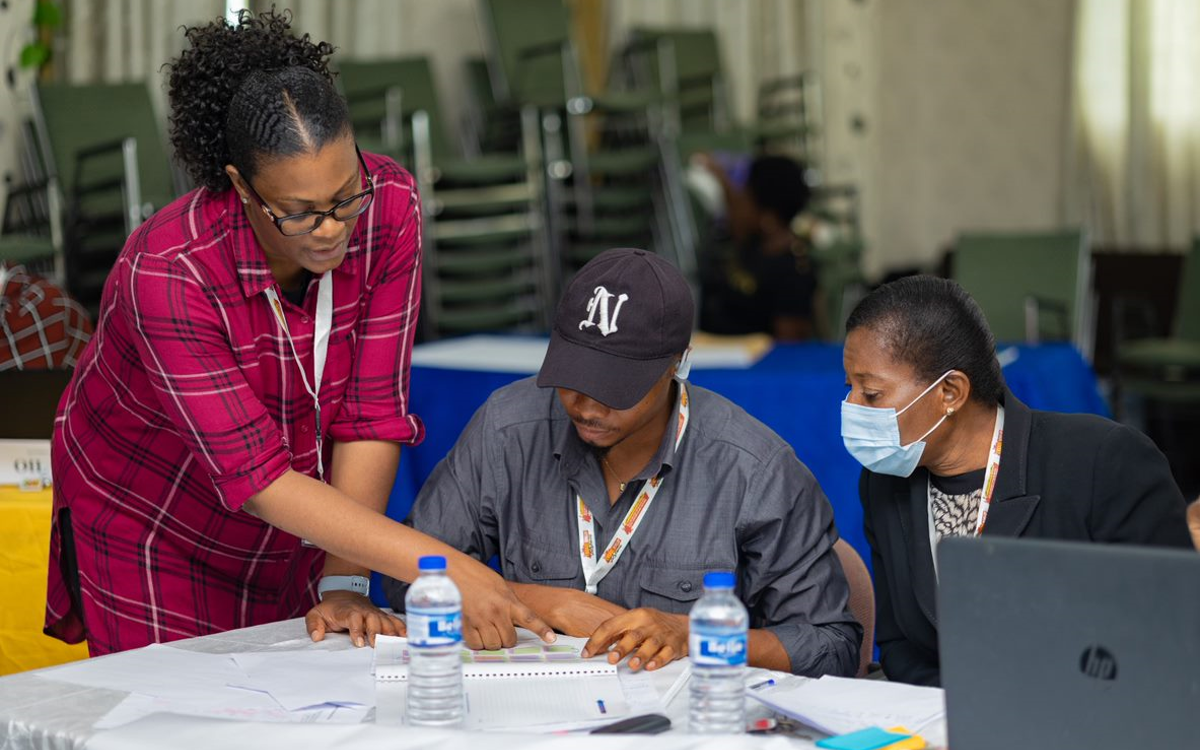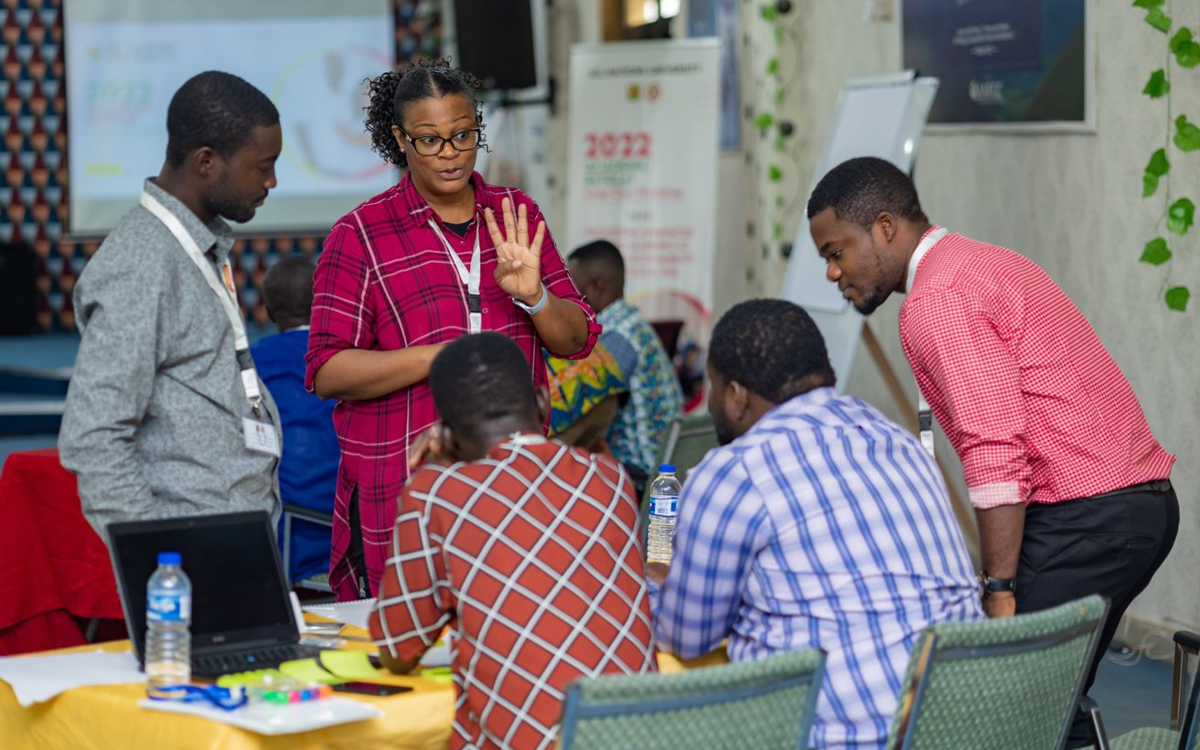

Fiona Khandoker
Programme Manager at the Association of Commonwealth Universities
Capacity strengthening programme, PEBL (Partnership for Enhanced and Blended Learning Partnership) West Africa, is now beyond the halfway stage. The participating universities are already seeing significant impact, especially when it comes to the programme’s reach and its ability to initiate new perspectives on blended learning.
Building on the success of the 2018 PEBL East Africa programme and supported by the Australian Department of Foreign Affairs and Trade (DFAT), the two-year initiative is working with 12 universities in Ghana and Nigeria to fortify the design and delivery of enhanced blended learning courses and seed innovation in university teaching. With the world of learning and teaching in a watershed period, PEBL’s ultimate aim is to nurture an ecosystem that enables individuals and institutions to effectively deliver blended learning in the present and the future.
A key pillar of the PEBL programme is cascade learning, or ‘training-the trainer’. Widely used in professional development, staff members trained under PEBL are encouraged to utilise the cascade model to train other cross-faculty staff at their home universities. A cadre of academics are expertly trained in blended learning, empowering them to share this enhanced knowledge with their peers, without compromising on quality. This was unequivocally demonstrated at All Nations University’s (ANU) 5-day academic retreat, which took place late last year.
Each day of the Ghanaian university’s retreat had a different focus, with an overarching theme of ‘Promoting enhanced blended learning at ANU for sustainability in the Digital Era’. Attendees heard from critical colleagues at other Ghanaian partner institutions, as well as the University President who reiterated his call for a seismic shift in teaching and learning.
The retreat programme provided opportunities for participants to learn about best practice in blended learning, develop accessible course materials and e-tivities, and receive feedback on their designs. They also digested findings from faculty Deans on the university’s learning infrastructure, attended a workshop on understanding how students learn, and shared their experiences of the PEBL West Africa programme to date. Day four was by far the best received though and this was the day that focused on cascade training, with PEBL trained delegates introducing colleagues to the Carpe Diem learning design methodology.


The Carpe Diem process is a well-respected approach to repurposing existing course materials for blended and online delivery. Originally designed based on research by Professor Gilly Salmon, it was later refined and developed by a number of UK and Australian universities.
Collaboration is key to Carpe Diem, not only between training leaders, participants, faculty and professional staff but also between academics and students. The process emphasises the idea that face-to-face learning cannot simply be switched online, it must be rethought and redesigned to encourage more than just 'page turning' e-learning.
Carpe Diem also goes beyond simply teaching academics more about technology and how to use it, it gives them the opportunity to put it to the test in authentic contexts. Workshops are often delivered over intense two-day periods, with a concentrated effort to ensure every moment is spent on designing outputs that could be put into immediate use. This is where the process gets its name from, the Latin translation for Carpe Diem is ‘seize the day’.
In feedback from the academic retreat, 78% of respondents indicated that the Carpe Diem workshop was the best session. 96% of participants indicated that the workshop prepared them well for their profession, while 100% said they would recommend the training to others.
This feedback was reinforced by Dr Carlene Kyeremeh, Vice President of Academic and Student Affairs at All Nations, who said: ‘One thing I've learned from PEBL West Africa is that what many think is online teaching is not online teaching. It isn’t just uploading the course material online for students to read before an exam, we must be able to ensure students are consistently engaging with the content and activities. PEBL has been a great source of guidance on this’.
Thankfully these sentiments are also being echoed by academics from the Nigerian universities taking part in the PEBL programme. Timothy Ipoola Olabiyi from Ladoke Akintola University of Technology (LAUTECH), Ogbomoso, recently told me that PEBL had helped to strengthen their support structures and bring teaching capabilities further in line with institutions in more developed nations.
‘In our institution, the Carpe Diem methodology has proven to be a paradigm shift. The university's mission and strategies are fully in favour of a blended approach to learning, but a huge gap exists in the implementation approach. Carpe Diem gave us leverage by decreasing the learning curves and providing the necessary scaffolds and frameworks to achieve the organization's objectives and goals’ said Timothy.
Timothy’s colleague Gbade Oyesina was equally as positive and highlighted a growing demand for this knowledge transfer: ‘Carpe Diem methodology is highly beneficial for people who have earlier been introduced to principles like learning outcomes, learning activities, and authentic assessment and are familiar with technology-driven pedagogical practices. With this knowledge, they can quickly repurpose the course for online consumption in under 48 hours and come out with definite action plans that lead to students' satisfaction in no time. Requests to conduct more similar workshops are pouring in.’
To date, more than 400 academics have been upskilled, through the PEBL West Africa programme, and the Carpe Diem methodology. When the programme reaches culmination later this year, that number is expected to have grown to more than 1,200, with over 5,000 students reaping the benefits!
